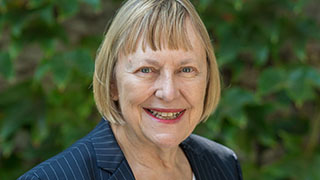Fulbright Diplomacy Scholar Chosen for New Guarani Aquifer Research
Thursday, July 20, 2023

Catherine Tinker's research into Water Diplomacy has been very influential in global water sustainability efforts.
Catherine Tinker, J.D., J.S.D., has been connected with the School of Diplomacy and International Relations faculty since 2001, and her credentials as an educator and international law expert have now taken her to new heights.
She was recently selected as a Fulbright U.S. Scholar for 2023-24 and invited to teach international law at the Federal University of Rio Grande do Sul (UFRGS) Law School in Porto Alegre, Brazil. While there, Tinker will also be conducting research on a new regional treaty for governance of transboundary fresh water in the Guarani Aquifer (which is located within Argentina, Brazil, Paraguay and Uruguay) from the Brazilian perspective.
“With this Fulbright grant, I am excited to expand upon the research I have already published about the aquifer,” said Tinker, referring to her previous appointment as a Fulbright U.S. Scholar in 2020 at the Universidad Nacional de San Martin in Buenos Aires, Argentina – which was cut short by the Covid-19 pandemic.
Her interest in this topic began when she was named "Foreign Visiting Professor" by the Brazilian Ministry of Education and taught full-time at the Federal University of Rio Grande do Sul Law School in Porto Alegre, Brazil. While there in 2004-05 and again in 2015, she conducted courses on international environmental law and public international law and began her research on the Guarani Aquifer, known to be the largest in the world.
Her research will analyze the implementation of the Guarani Aquifer Agreement by Brazil and its neighbors, both as a model framework for cooperation in governance of fresh water sources based on scientific studies and international law and as an example of water diplomacy in practice. At stake is the continued ability of the Guarani Aquifer to provide fresh drinking water now for communities and municipalities across a vast area as well as for future generations, while serving the water needs of agriculture and other multiple uses in Brazil and the region.
Tinker’s findings will inform her book in progress and her teaching on public international law, sustainable development and environmental policy when she returns to the School of Diplomacy and International Relations. “My research on the implementation of the Guarani Aquifer Agreement may aid in ensuring sustainable, equitable and multiple uses of transboundary water and protection of the groundwater itself for future uses in a water-scarce world,” she said.
In addition, Tinker was the first Distinguished Fellow of the Center for United Nations and Global Governance Studies, appointed by the faculty, now extended through 2026, and a former Visiting Associate Professor at the School of Diplomacy and International Relations. She is also the founder, president, and United Nations representative for the non-governmental organization The Tinker Institute on International Law and Organizations (TIILO) where select diplomacy students are chosen to serve as interns. Now entering its 31st year, and accredited to the UN through ECOSOC since 1996, TIILO continues to inform and involve the international community on issues such as sustainable development, oceans, biodiversity and global governance.
“The School of Diplomacy is thrilled to have its faculty included in the prestigious Fulbright Scholar Program for the second year in a row,” said Courtney B. Smith, Ph.D., dean of the School of Diplomacy and International Relations and vice dean of the School of Law. “Having Dr. Tinker continue her critical research in Brazil next spring will build our international reputation and enable her to make additional contributions to our understanding of vital water resources. She has been a tremendous member of the Diplomacy community for more than 20 years by teaching our students in the classroom and by fostering their professional development through the Tinker Institute on International Law and Organizations.”
Categories: Law, Nation and World






